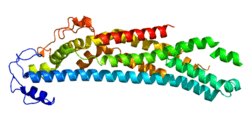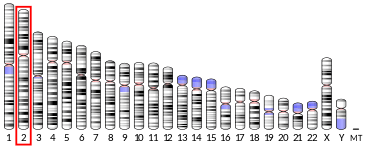Glypican 1
Glypican-1 is a protein that in humans is encoded by the GPC1 gene.[5][6]
Function
Cell surface heparan sulfate proteoglycans are composed of a membrane-associated protein core substituted with a variable number of heparan sulfate chains. Members of the glypican-related integral membrane proteoglycan family (GRIPS) contain a core protein anchored to the cytoplasmic membrane via a glycosyl phosphatidylinositol linkage. These proteins may play a role in the control of cell division and growth regulation.[6]
Clinical significance
This protein is involved in the misfolding of normal prion proteins in the cell membrane to the infectious prion form.[8]
In 2015 it was reported that the presence of this protein in exosomes in patients' blood is able to detect early pancreatic cancer with absolute specificity and sensitivity.[9] However this conclusion is disputed.[10] and in more recent overviews of potential markers for pancreatic cancer, Glypican 1 is not mentioned.[11][12]
See also
References
- GRCh38: Ensembl release 89: ENSG00000063660 - Ensembl, May 2017
- GRCm38: Ensembl release 89: ENSMUSG00000034220 - Ensembl, May 2017
- "Human PubMed Reference:". National Center for Biotechnology Information, U.S. National Library of Medicine.
- "Mouse PubMed Reference:". National Center for Biotechnology Information, U.S. National Library of Medicine.
- Vermeesch JR, Mertens G, David G, Marynen P (Jul 1995). "Assignment of the human glypican gene (GPC1) to 2q35-q37 by fluorescence in situ hybridization". Genomics. 25 (1): 327–9. doi:10.1016/0888-7543(95)80152-C. PMID 7774946.
- "Entrez Gene: GPC1 glypican 1".
- Ronca F, Andersen JS, Paech V, Margolis RU (August 2001). "Characterization of Slit protein interactions with glypican-1". J. Biol. Chem. 276 (31): 29141–7. doi:10.1074/jbc.M100240200. PMID 11375980.
- Taylor DR, Whitehouse IJ, Hooper NM (November 2009). "Glypican-1 mediates both prion protein lipid raft association and disease isoform formation". PLoS Pathogens. 5 (11): e1000666. doi:10.1371/journal.ppat.1000666. PMC 2773931. PMID 19936054.
- Melo SA, Luecke LB, Kahlert C, Fernandez AF, Gammon ST, Kaye J, LeBleu VS, Mittendorf EA, Weitz J, Rahbari N, Reissfelder C, Pilarsky C, Fraga MF, Piwnica-Worms D, Kalluri R (July 2015). "Glypican-1 identifies cancer exosomes and detects early pancreatic cancer". Nature. 523 (7559): 177–82. doi:10.1038/nature14581. PMC 4825698. PMID 26106858.
- Discussions at www.pubpeer.com; https://pubpeer.com/publications/70714D8ACB8F13164A2752B4335F38#fb119888
- Balasenthil S, Huang Y, Liu S, Marsh T, Chen J, Stass SA, KuKuruga D, Brand R, Chen N, Frazier ML, Jack Lee J, Srivastava S, Sen S, McNeill Killary A (August 2017). "A Plasma Biomarker Panel to Identify Surgically Resectable Early-Stage Pancreatic Cancer". Journal of the National Cancer Institute. 109 (8). doi:10.1093/jnci/djw341. PMC 6059209. PMID 28376184.
- Chang JC, Kundranda M (March 2017). "Novel Diagnostic and Predictive Biomarkers in Pancreatic Adenocarcinoma". International Journal of Molecular Sciences. 18 (3). doi:10.3390/ijms18030667. PMC 5372679. PMID 28335509.
Further reading
- Karthikeyan L; Maurel P; Rauch U; et al. (1992). "Cloning of a major heparan sulfate proteoglycan from brain and identification as the rat form of glypican". Biochem. Biophys. Res. Commun. 188 (1): 395–401. doi:10.1016/0006-291X(92)92398-H. PMID 1417860.
- David G; Lories V; Decock B; et al. (1991). "Molecular cloning of a phosphatidylinositol-anchored membrane heparan sulfate proteoglycan from human lung fibroblasts". J. Cell Biol. 111 (6 Pt 2): 3165–76. doi:10.1083/jcb.111.6.3165. PMC 2116352. PMID 2148568.
- Maruyama K, Sugano S (1994). "Oligo-capping: a simple method to replace the cap structure of eukaryotic mRNAs with oligoribonucleotides". Gene. 138 (1–2): 171–4. doi:10.1016/0378-1119(94)90802-8. PMID 8125298.
- Suzuki Y; Yoshitomo-Nakagawa K; Maruyama K; et al. (1997). "Construction and characterization of a full length-enriched and a 5'-end-enriched cDNA library". Gene. 200 (1–2): 149–56. doi:10.1016/S0378-1119(97)00411-3. PMID 9373149.
- Kleeff J; Ishiwata T; Kumbasar A; et al. (1998). "The cell-surface heparan sulfate proteoglycan glypican-1 regulates growth factor action in pancreatic carcinoma cells and is overexpressed in human pancreatic cancer". J. Clin. Invest. 102 (9): 1662–73. doi:10.1172/JCI4105. PMC 509114. PMID 9802880.
- Gengrinovitch S; Berman B; David G; et al. (1999). "Glypican-1 is a VEGF165 binding proteoglycan that acts as an extracellular chaperone for VEGF165". J. Biol. Chem. 274 (16): 10816–22. doi:10.1074/jbc.274.16.10816. PMID 10196157.
- Liang Y; Annan RS; Carr SA; et al. (1999). "Mammalian homologues of the Drosophila slit protein are ligands of the heparan sulfate proteoglycan glypican-1 in brain". J. Biol. Chem. 274 (25): 17885–92. doi:10.1074/jbc.274.25.17885. PMID 10364234.
- Schofield KP, Gallagher JT, David G (2000). "Expression of proteoglycan core proteins in human bone marrow stroma". Biochem. J. 343 Pt 3: 663–8. doi:10.1042/0264-6021:3430663. PMC 1220599. PMID 10527946.
- Karumanchi SA; Jha V; Ramchandran R; et al. (2001). "Cell surface glypicans are low-affinity endostatin receptors" (PDF). Mol. Cell. 7 (4): 811–22. doi:10.1016/S1097-2765(01)00225-8. PMID 11336704.
- Matsuda K; Maruyama H; Guo F; et al. (2001). "Glypican-1 is overexpressed in human breast cancer and modulates the mitogenic effects of multiple heparin-binding growth factors in breast cancer cells". Cancer Res. 61 (14): 5562–9. PMID 11454708.
- Alvarez K, Fadic R, Brandan E (2002). "Augmented synthesis and differential localization of heparan sulfate proteoglycans in Duchenne muscular dystrophy". J. Cell. Biochem. 85 (4): 703–13. doi:10.1002/jcb.10184. PMID 11968010.
- Ding K; Mani K; Cheng F; et al. (2002). "Copper-dependent autocleavage of glypican-1 heparan sulfate by nitric oxide derived from intrinsic nitrosothiols". J. Biol. Chem. 277 (36): 33353–60. doi:10.1074/jbc.M203383200. PMID 12084716.
- Strausberg RL; Feingold EA; Grouse LH; et al. (2003). "Generation and initial analysis of more than 15,000 full-length human and mouse cDNA sequences". Proc. Natl. Acad. Sci. U.S.A. 99 (26): 16899–903. doi:10.1073/pnas.242603899. PMC 139241. PMID 12477932.
- Belting M; Mani K; Jönsson M; et al. (2004). "Glypican-1 is a vehicle for polyamine uptake in mammalian cells: a pivotal role for nitrosothiol-derived nitric oxide". J. Biol. Chem. 278 (47): 47181–9. doi:10.1074/jbc.M308325200. PMID 12972423.
- Ota T; Suzuki Y; Nishikawa T; et al. (2004). "Complete sequencing and characterization of 21,243 full-length human cDNAs". Nat. Genet. 36 (1): 40–5. doi:10.1038/ng1285. PMID 14702039.
- Watanabe N; Araki W; Chui DH; et al. (2004). "Glypican-1 as an Abeta binding HSPG in the human brain: its localization in DIG domains and possible roles in the pathogenesis of Alzheimer's disease". FASEB J. 18 (9): 1013–5. doi:10.1096/fj.03-1040fje. PMID 15084524.
- Li J; Kleeff J; Kayed H; et al. (2004). "Glypican-1 antisense transfection modulates TGF-beta-dependent signaling in Colo-357 pancreatic cancer cells". Biochem. Biophys. Res. Commun. 320 (4): 1148–55. doi:10.1016/j.bbrc.2004.06.063. PMID 15249209.
- Davies EJ; Blackhall FH; Shanks JH; et al. (2005). "Distribution and clinical significance of heparan sulfate proteoglycans in ovarian cancer". Clin. Cancer Res. 10 (15): 5178–86. doi:10.1158/1078-0432.CCR-03-0103. PMID 15297422.




